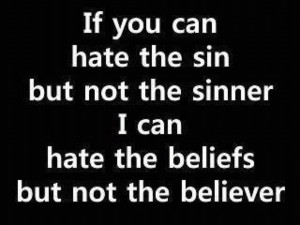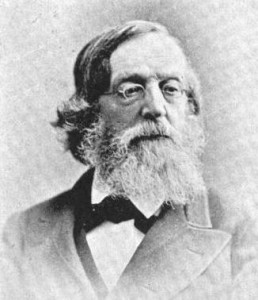 We’ve had an interesting discussion on the Hellbound? Facebook page and elsewhere lately about the saying, “Love the sinner, hate the sin.” (I’m more familiar with the reverse phrasing: “Hate the sin, love the sinner.”) The discussion was spurred by this comment from Wendy Thomas, one of our readers:
We’ve had an interesting discussion on the Hellbound? Facebook page and elsewhere lately about the saying, “Love the sinner, hate the sin.” (I’m more familiar with the reverse phrasing: “Hate the sin, love the sinner.”) The discussion was spurred by this comment from Wendy Thomas, one of our readers:
Love the sinner, hate the sin is a crock. It’s a copout that makes you in a different group as those “sinners.” LOVE, love the sinner. That’s where that sentence should end.
Her comment generated three main responses:
1) Yes! Totally agree.
2) Others suggested we follow Tony Campolo’s lead and change the phrase to: “Love the sinner, hate MY sin.”
3) A third group disputed the sentiment, arguing from Romans 12 that since God hates sin, so should we.
My response? I tend to agree with Wendy’s comment for a few reasons:
1) As Wendy points out, labeling anyone a “sinner” creates an us/them scenario, which is almost always a pretext for scapegoating them. It also implies that we occupy the moral high ground, that we have the inside edge on truth, and all sorts of other self-righteous thoughts. Like all scapegoating maneuvers, pointing out the sins of others–even in a benevolent way–conveniently blinds us to our own sin.
2) I don’t think we should hate anything, because hate tends to be a product of love spurned, so our level of hatred probably reflects our level of desire to indulge in the behavior we supposedly scorn. And as everyone knows, we tend to become what we hate the most. God’s “hatred” of sin leads to self-sacrifice. Ours tends to lead to sacrifice–of the sinner.
Case in point: I’m currently reading Dirty Wars, and I’m absolutely appalled not only by the extent of America’s black ops in the Middle East and elsewhere, but perhaps even more so by the fact they are closely presided over by a President who was given a Nobel Peace Prize (and who included a justification for war in his acceptance speech!). Do I hate this sort of behavior? Yes! In fact, I told my wife several times that if I was a young Muslim man and had read that book, I would probably be boarding a plane to Somalia or Yemen or Pakistan or anywhere else where I could join the jihad.
But as many young jihadists have learned, indulging such hatred would ultimately be my undoing–just as I believe America’s “hatred” or terrorism will ultimately be its undoing, b/c it is turning into a global terrorist organization, launching drone strikes and conducting assassinations anywhere, everywhere, and against anyone it feels might prove to be a threat. So while we can’t help but react emotionally against such abhorrent behavior, I don’t think it’s safe to indulge those feelings. Rather, I think the spiritual discipline is to seek to transform those feelings into something constructive by first of all acknowledging our own sin and temptation in the face of such evil so that we don’t unwittingly become a party to it. Then, rather than respond in kind, the truly creative and heroic act is to model a response to evil that doesn’t require us to mirror the evil we are countering.
3) Looked at another way, perhaps our level of hatred is a reflection of the level of pain we feel b/c we have been (or feel we have been) victimized by a particular behavior. Once again though, our hatred is merely the flip side of love. The intensity of our pain is a direct reflection of the perceived level of betrayal. However, indulging that hatred is counter-productive. I know many victims of childhood abuse, for example, and I have witnessed firsthand how such hatred becomes the “gateway drug” to obsession and, ultimately, self-destruction.
So, love the sinner, period–especially if that sinner is you!
(Or, as Robert Rodriguez put it, “If you hire Machete to kill the bad guy, you better make damn sure the bad guy isn’t you!)











